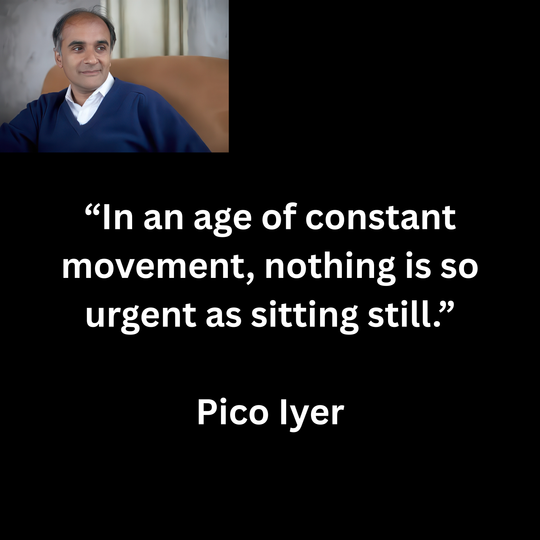
Are You in a State of Urgency?
It happened slowly but surely.
During my career as an academic surgeon, I became addicted to busyness and urgency, without realizing it was happening, until it seemed like it was too late to do anything about it.
The definition of addiction is continued use of a substance or behavior despite harmful consequences.
And the "pill" I took that led to the behavior that continued despite harmful consequences? The word Yes.
Can you see two more patients in clinic today? Yes
Can you add two more cases tomorrow? Yes
Can you review this manuscript? Yes
Can you be on this hospital committee? Yes
Can you be on this society committee? Yes
Can you give grand rounds? Yes
Can you give a talk at the ____? Yes
Can you teach the residents on Wed? Yes
Can you run the medical student clerkship? Yes
Can you be the Associate Program Director? Yes

The modern narcotic. And just like the iPhone, Instagram (or in my case, Purley Elizabeth's Double Chocolate Cookie Dough Granola - I warn you, don't even think about clicking the link unless....), you don't even need a prescription to use it.
And as Kandi Wien points out in the attached article from Harvard Business Review, the harmful consequences are chronic stress and burnout.
I used to poo poo the idea of chronic stress as nonsense. I was wrong, once again.
Chronic stress is real. It is a continued low-grade elevation of cortisol and catecholamines that leads to illness and premature mortality from all causes, as it dramatically shortens telomere length, the little caps on the ends of our chromosomes that determine how many more times a cell can divide.
When they get too short, the cell dies or spews out inflammation. End result? Earlier onset of diseases and death.
But it also screws up your relationship with yourself (not enough time or patience to reflect and notice anything) and with others. After all, who wants to breathe the secondhand smoke of a human wildfire?
Plus, it gives you the illusion that you are being more productive and getting things done. Maybe. But are you getting the important things done? The things that are important to you, if you even know what those things are, given the lack of time and energy needed to figure those more profound questions out.
As Wiens says, "One of the things that makes hurry sickness difficult to detect is its ability to come disguised as efficiency, productivity, achievement, or creating value for the organization. As each of these are prized qualities and signs of high performance, you may not even realize something is wrong until your constant hurrying exacts a price."
It just seems easier to just do what you're used to just doing, just by default. The opportunity costs? Burnout, loneliness, lack of fulfillment, disconnection from your loved ones, to name a few. Bad enough, but the biggest tragedy? Disconnection from yourself, because you're in a trance. Which means your fullest and best self is a blur to you and others as you speed down the urgency and productivity freeway.
I remember how I used to think about people struggling with addictions. Just stop taking the stuff. Easy to say from the sunny perch of a healthy mind and body. But when you're stuck in the addiction quicksand, most of us need a helping hand. And since overextension and hurry sickness is one of the regular challenges I see with people I coach, I thought I would try to lend a helping hand by providing some guidelines or ideas on when to say no and when to say yes, instead of saying the easy thing - "just start saying no."
The author Derek Sivers writes about what is worth doing in his book Hell Yeah or No: "If you’re not feeling “hell yeah!” then say no. Most of us have lives filled with mediocrity. We said yes to things that we feel half-hearted about. So we’re too busy to react when opportunities come our way. We miss out on the great because we’re busy with the mediocre. The solution is to say yes to less. If you’re not feeling “Hell yeah, that would be awesome!” about something, say no."
I agree wholeheartedly. But for me, it isn't quite granular enough for the real world and its pressures, and in my opinion, it doesn't tell the whole story. To develop a proper and deeper foundation for why we, as Derek says, say yes to mediocrity, it is important to understand the psychological engines driving us to say yes to mediocrity.
I recommend taking some time to really ponder each of these drivers and what role they may be playing in your life.
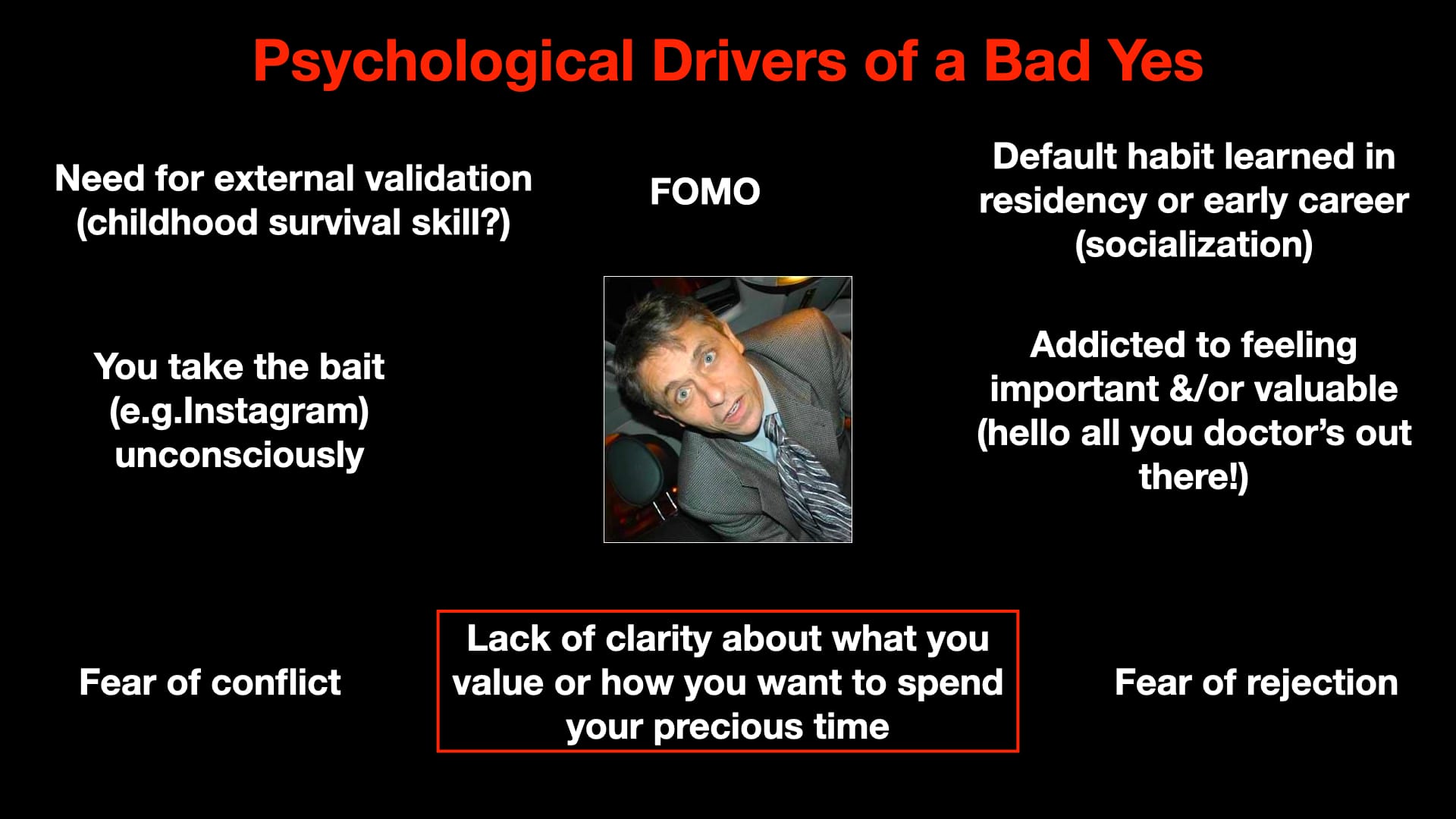
Notice that I put a red box around the lack of clarity about what you value or how you want to spend your precious time. If you do the work to figure this out, it becomes the rocket fuel to power your fulfillment journey free of the jetsam (cargo that is cast overboard to lighten the load in time of distress) of accumulated soul sucking mediocre activities given birth to by the word yes.
Ok, so now that we see the forces at play driving all of us humans to sputter yes all day, it's time to turn to figuring out when a yes is a good yes. Derek urges us to follow this rule: "If you’re not feeling “Hell Yes!” then say no." I agree, but...there are a few nuances that I think are critical for a deeper understanding of when to say Hell Yes.
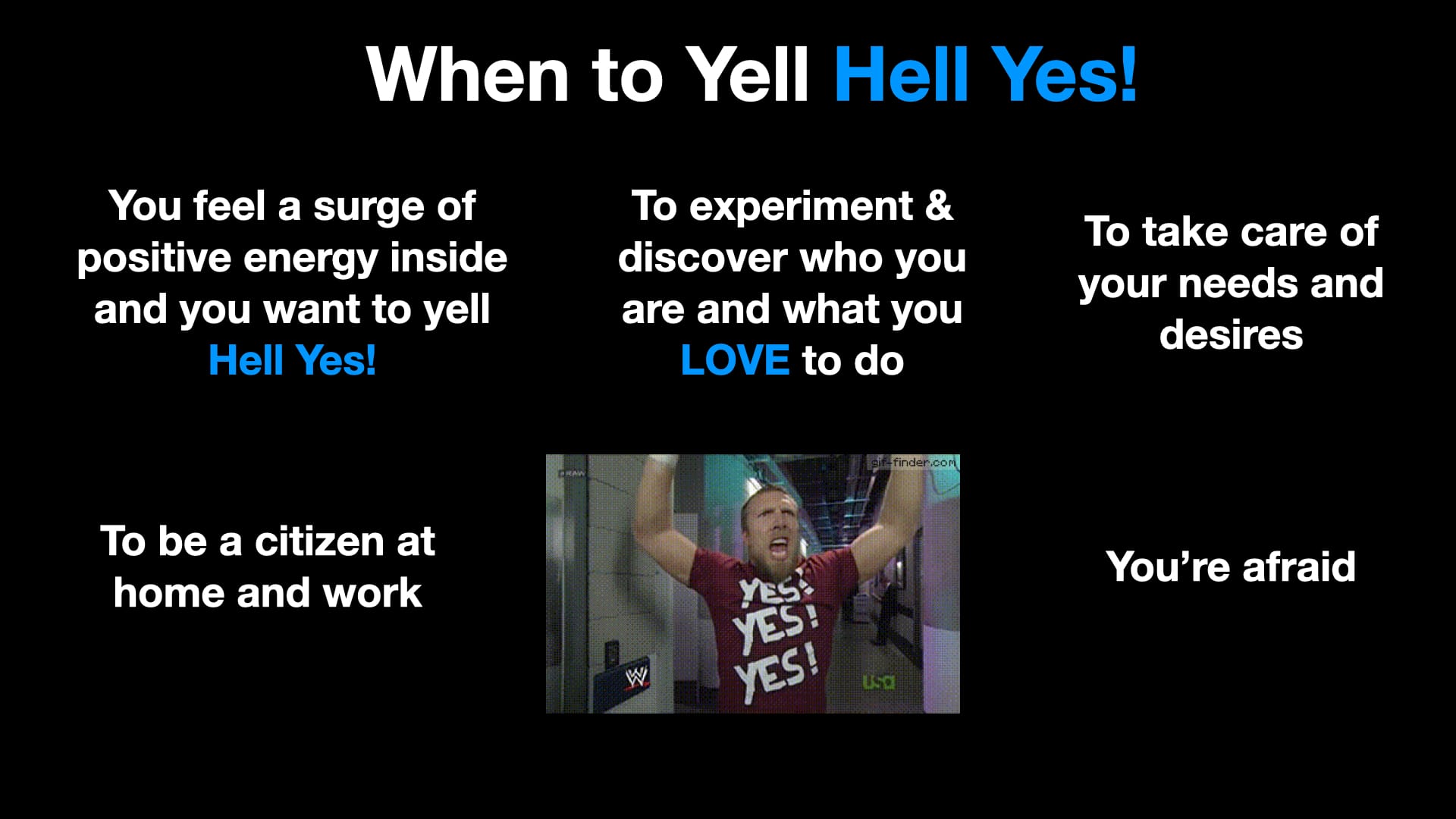
Let's take each of these reasons to say Hell Yes in order.
You feel a surge of positive energy inside, and you want to yell Hell Yes!
These are the things that light you up inside. They light up what Marcus Buckingham calls our Red Threads in the book Love + Work.
From the book: "There are activities where you disappear within them, and time flies by. Think of these as your “Red Threads.” Your life—at school, home, work—is composed of many threads, many different activities, situations, and people. Some of these threads are black, white, gray, brown, emotionally meager, a little up, a little down, don’t do much to move the needle. But some of them are red.
Red threads are made of a very different material. They appear to be extremely positively charged. You find yourself instinctively wanting to pull on these threads. And when you do, your life feels easier, more natural, time rushes by. These threads are the source of your Wyrd, your uniqueness, felt and then expressed in certain activities."
Wyrd is an old Norse term that means your soul or your unique path in life. Living a fulfilled life stems from figuring out what your Wyrd is, since we are all Wyrd. I've attached an exercise from the book at the end of this post that will help you discover your own Red Threads that will help guide you to learn what to say Hell Yes to. That is, if you're not too busy!
Caveat: One needs to be aware of the deeper mental source of this surge of positive energy. An example: I remember the day I opened a letter asking me to be one of the editors of a prestigious academic surgical journal. I felt that surge of positive energy, but the surge came from the external validation of being asked and from the prestige and recognition of my peers, and not from loving the actual work of being an editor.
I had been doing reviews for years, and at this stage of my career (see below), for me, the answer to this ask should have been a Hell No. But my ego told me to say yes, and I didn't have the courage to say no. For years, every time a new manuscript came in the mail (pre-email paleolithic era), I was filled with dread.
End result? I gave up my precious time to do the reviews. I gave up precious mental energy to do the reviews. I gave up my peace of mind because of the stress I felt doing the reviews. I gave up doing other things I could have been doing (usually they were done at night or on the weekends, while my wife and children did other things) to do the reviews. These are all the opportunity costs I incurred from saying yes.
So say Hell Yes! to your Red Threads and be as Wyrd as you are meant to be.
To experiment and discover who you are and what you LOVE to do.
The big challenge when you are young and lack depth of experience? You rarely know who you are, what your intrinsic drivers and motivations are, and what you love to do. It takes time, an open mind, and experimentation.
Which means you need to try a lot of things and see what lands. This is just as true even if you have figured out that you want to be a surgeon or any other career that falls within a "traditional" career path. There are many facets and possibilities within a surgical career, even if you totally love operating on and taking care of patients.
The challenge here? You may want to yell Hell No at some of these opportunities to experiment. An example: After finishing my thoracic surgical training at the University of Toronto, I returned as a bright-eyed and bushy-tailed young surgeon to the University of Minnesota, ready to start my academic surgical career. Shortly after pounding the nail in the wall and hanging my diplomas on the wall of my new office (still not sure why I did that), I'm summoned to the chair's office.
The setup is classic. I am sitting in a chair in front of his massive desk, and his chair is higher than mine, so he towers above me just enough for the power play. After a few pleasantries, the purpose of my visit was delivered: "Mike, I want you to take over the medical student clerkship."
I remember the moment vividly: His grin, the brief pregnant silence as I mustered up all of my agency to fake it with the acting prowess worthy of an Academy Award for pretending as if it was a great idea, while simultaneously drowning in an undercurrent of the murky, polluted waters of serious chain-gang-level emotional labor.
"Great!" I muttered.
My real thought was f*&^ you and f*&^ that.
Turns out it was one of the best things that ever happened to me. I fired up my protocol for dealing with problems or challenges:
1. Think - Problem? Good!
2. Detach from the ego, emotions, and old perspectives.
3. Accept the realities of the situation.
4. Decide what you will not accept.
5. Reframe your perspective on the problem.
6. Act.
Once I detached and accepted my new reality (I'd be lying if I pretended it all happened that day), I decided I would not accept continuing to run the clerkship with the same treading-water indifference of my predecessors.
Instead, I reframed it as an opportunity to make it the best clinical rotation in the medical school. Then I went to bat with my changes: A new standardized written exam and introduced oral exams. A clear curriculum designed to teach most medical students who are not going into surgery the core concepts they would need, regardless of specialty choice. Interviewing the students at the end of the rotation about their experience on the rotation and the quality of the teaching by the residents and faculty, and then sharing the feedback with them in personal letters.
End result? It became the most highly rated clinical clerkship in the medical school. Bigger end result? Education became a passion of mine. Thanks to the chair, I found one of my Red Threads, and I became the program director of the general surgery program, which was very unusual for a thoracic surgeon.
So early in one's life or career, I think it is important to say Hell Yes to things, even if your gut says Hell No, because you just never know which of your hidden Red Threads is lurking down under in your neurologic cauldron waiting to be discovered by a Hell Yes with the right mindset.
In this circumstance, I would reframe Hell Yes to: Hell Yes, I'll Give It a Try! Then, whatever it is, attack it, learn about the thing, and learn more about yourself, what makes you tick, and what your Red Threads are.
Each and every one of us is a laboratory of one. When you run a lab, you conduct experiments to find the truth, to discover reality, to figure out how things work. It's the same with each of us. We all have our own truth and reality - the wildly complex amalgamation of our cognition, emotions, and gut instincts that make each of us utterly unique, or Wyrd. Except for a lucky few, it takes time and experimentation to discover your Wyrd.
By running experiments, over time, in the earlier phases of your career and life, you build knowledge about your True North or Internal Compass that tells you what brings you natural energy, passion, and meaning, and this knowledge becomes your filter for Hell Yes or Hell No decision making over time.
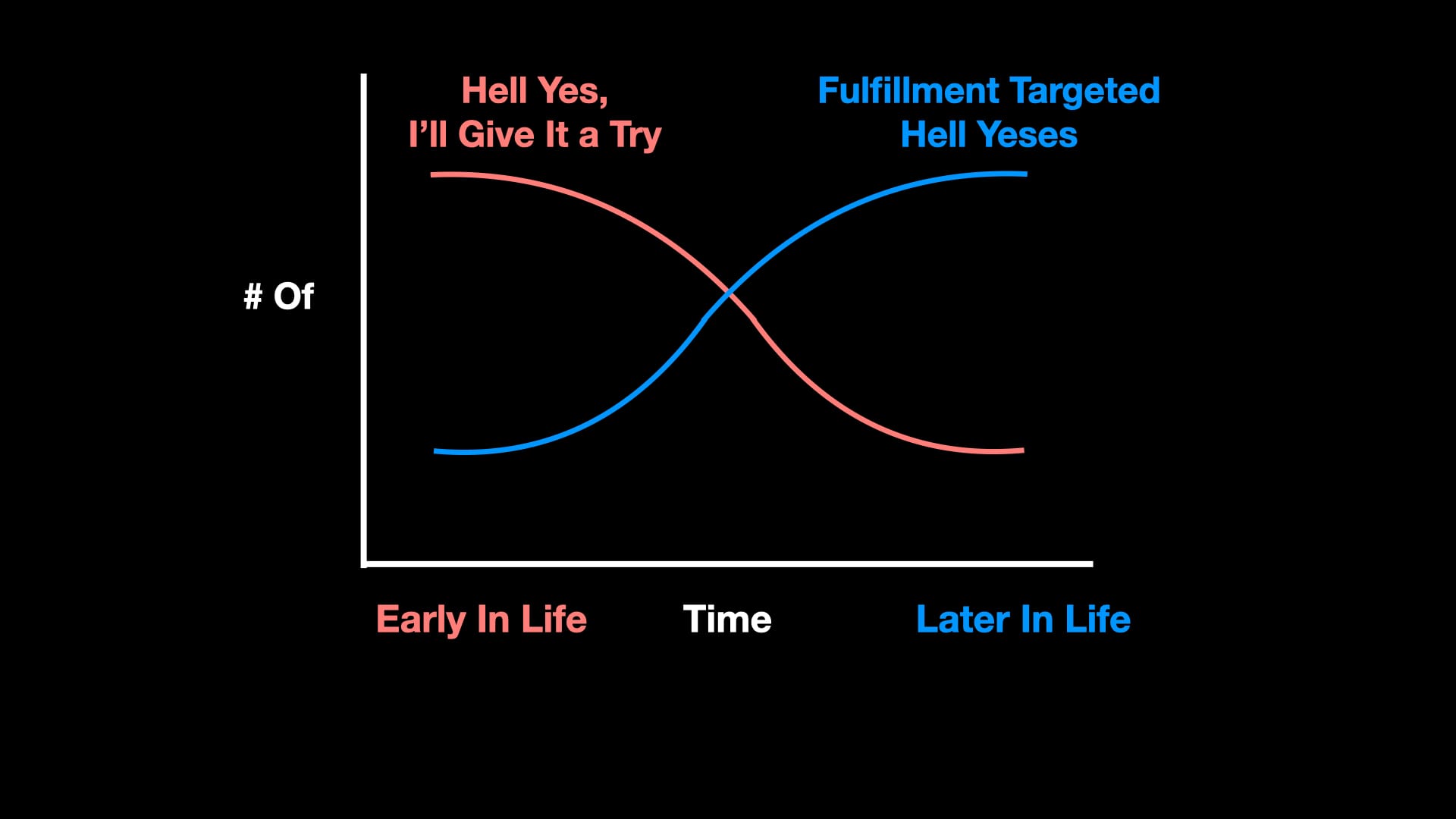
It takes courage and clear-eyed intentionality to respond to requests, but you must, or you risk entering a slow downward spiral into a life lived that is not yours and all of its consequences.
To take care of your needs and desires.
This one is pretty straightforward, but not easy. As physicians, we feel the relentless pull of our responsibility to take care of patients. It is an incredible gift and an honor. But the combination of this responsibility combined with the powerful feedback loop of societal praise, patient and family gratitude, the fulfillment from helping others, and the pressures of not screwing up all create a strong mental gravitational field that can lead us to ignore our needs and desires, such as spending time alone or with family and friends, exercise, hobbies, or anything that we do for the pure pleasure of it.
One way to approach this is to create your own personal Psychological Center of Gravity (disclaimer, I co-opted this phrase from Oliver Burkeman in this article, so now there are two brilliant uses of the phrase!).
We all (I hope) have activities outside of work that bring us joy, fulfillment, and pleasure. (The same is true of work - your Red Thread activities). Make a list of the core things that nourish you and your soul, and whittle it down to two lists: critical activities, and nice to do but not critical activities. Your core Psychological Center of Gravity should consist of those critical activities. Then, intentionally ensure that they are integrated into your life in a way that works for you and your circumstances.
So, put your mental and physical health front and center, so you can be your best self, for yourself, and everyone in your orbit. Say "Hell Yes to Me!
To be a citizen at home and at work
Small example from my past home life. My wife, Lea, was a high-risk obstetrician (now retired) and took in-house call 5-6 nights a month. I would vacuum and mop our white tile floors and totally tidy up the house before she came home from work because it made her happy, and she could then relax and enjoy the day on her terms.
Same thing at work. The trick here is the same as when I vacuum before Lea comes home. Find a reason or purpose for the activity that allows you to reframe it, and then embrace it, mentally, to the best of your ability.
Being a team player is essential, but the bright line between being a team player and drifting off slowly into the bumpy terrain of the psychological landscape of a bad yes must be kept front and center, lest you slowly but surely slip away from yourself.
So, with the right set up, say Hell Yes, I'll Do It for the Team!
You're Afraid
We were recently in Los Angeles for our daughter Anne's graduation from Loyola Marymount. The guest commencement speaker was Questlove. Apparently, it is embarrassing that I had no idea who Questlove is, since everyone else knows who he is.
Well, Questlove gave a sensational commencement speech (the best by far I have heard), and he said something that floored me. I pulled the clip from the speech:
Clip of Questlove's Loyola Marymount Commencement Speech
"The stuff that changes your life is usually buried under your deepest fears."
So, so true, right? A few examples from my experience.
Leaving my clinical and academic career after getting out of Hazelden. The fear was crippling (I do mean crippling) but fortunately, my heart and gut were firm on the decision. It was hard as hell to get through, but it led to a life I could not have imagined.
Working with my first coaching client when I was drowning in impostor syndrome, but fortunately, my heart and gut were firm on the decision.
Writing this newsletter. The number of stops and starts, design iterations, websites, raging impostor syndrome, and the fear of writing more useless drivel that flows out of the corners of the lips of the internet - to name a few - all conspired to keep me small, but fortunately, my heart and gut were firm on the decision.
Get the point? You can't think your way through everything. To follow your path, to fertilize your Wyrd, your soul, so you can live a life of authenticity, fulfillment, contentment, and connection, you must have alignment of your heart and gut, your emotions and instincts, with your thinking.
So when you feel the calling of your soul, yell "Hell Yes, I'll Do It Afraid."
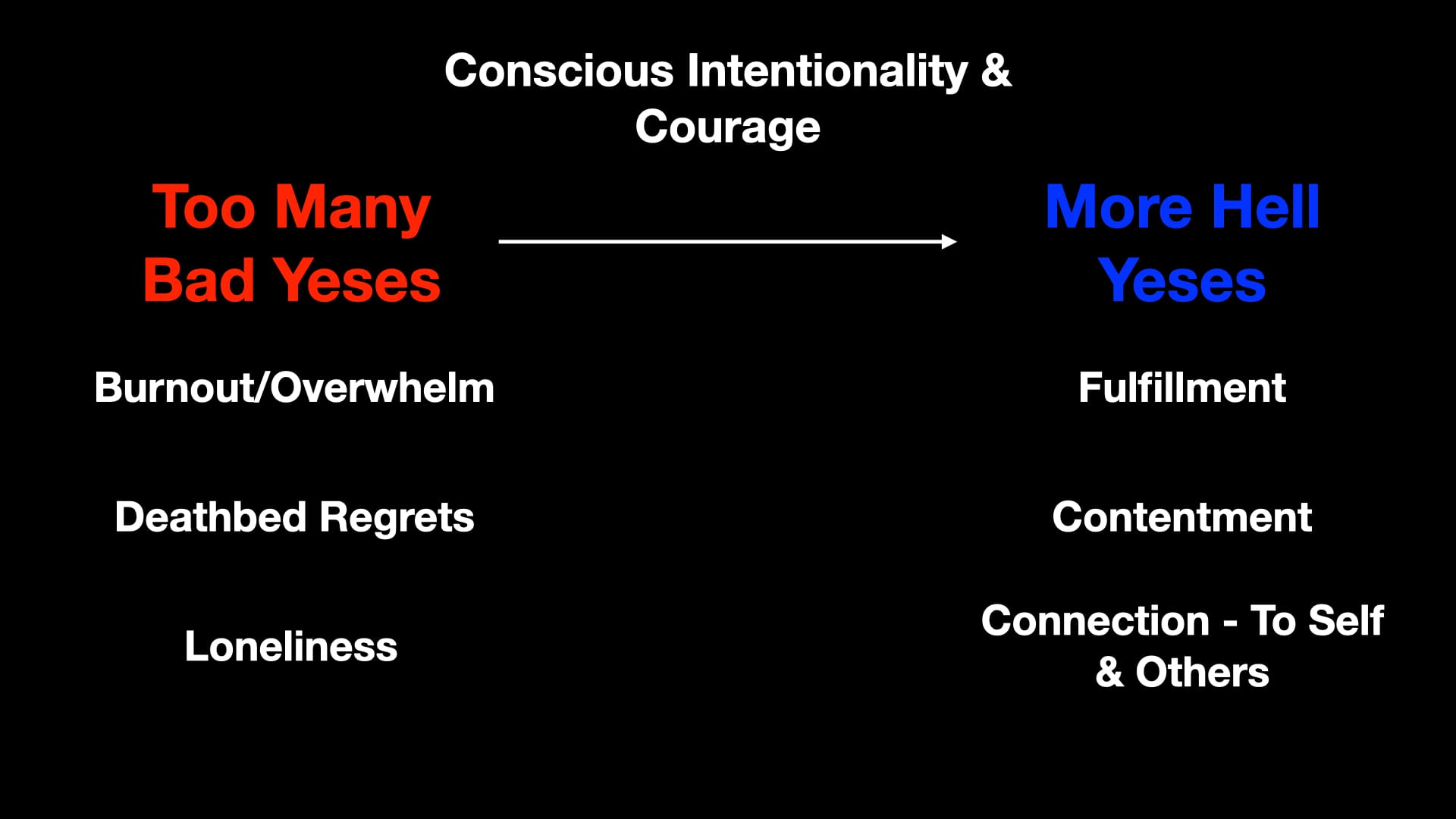
I end now with a few passages (slightly paraphrased for clarity) from the very spiritual book Four Thousand Weeks: Time Management for Mortals by Oliver Burkeman.
"What does it mean to be? Our being is totally, utterly bound up with our finite time. So bound up that the two are synonymous. To be, for a human, is above all to exist temporally in the stretch between birth and death, certain that the end will come yet unable to know when. We tend to speak about our having a limited amount of time, but it makes more sense to say we are a limited amount of time.
In other words, time defines us. We are borne forward on the river of time, with no possibility of stepping out of the flow, onward toward our inevitable deaths—which, to make matters even more ticklish, could arrive at any moment.
The only real question about all this finitude is whether we’re willing to confront it or not. And this, for Heidegger, is the central challenge of human existence: since finitude defines our lives, he argues that living a truly authentic life—becoming fully human—means facing up to that fact. We must live out our lives, to whatever extent we can, in clear-eyed acknowledgment of our limitations, in the undeluded mode of existence that Heidegger calls “Being-towards-death,” aware that this is it, that life is not a dress rehearsal, that every choice requires myriad sacrifices, and that time is always already running out—indeed, that it may run out today, tomorrow, or next month.
It is amazing to have been granted any being at all. From this viewpoint, the situation starts to seem much less regrettable: each moment of decision becomes an opportunity to select from an enticing menu of possibilities, when you might easily never have been presented with the menu to begin with."
Study your menu carefully, make your best decisions with the principles I've outlined, and do your best not to let it all happen by someone else's design or by default.
As Annie Dillard said: "How we spend our days is, of course, how we spend our lives."
Thoughts, ideas, or opinions about this important topic, or feedback with a thumbs up or down, are greatly appreciated. You can also drop me an email at michael@michaelmaddaus.com.
